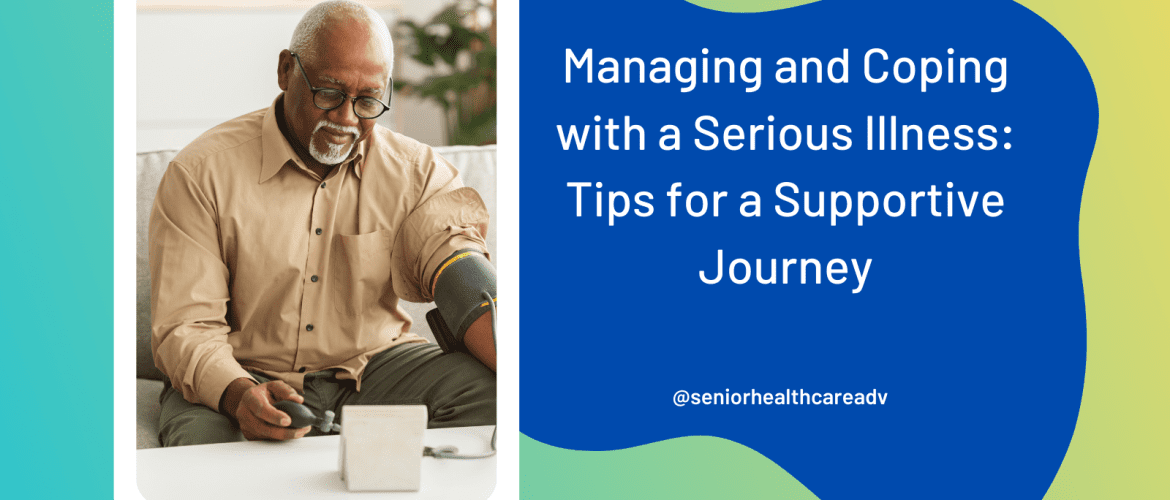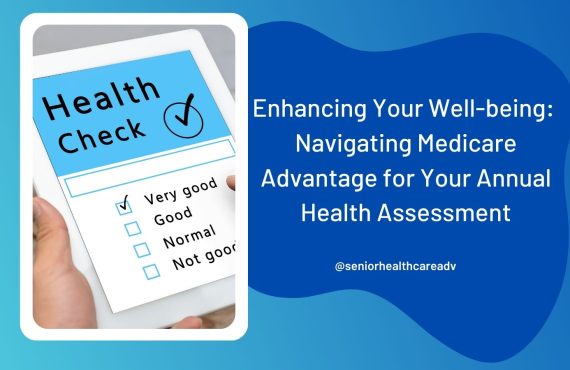Managing and Coping with a Serious Illness: Tips for a Supportive Journey
A diagnosis of heart disease, cancer, or other serious illnesses can be traumatic. But there are effective measures you can take to preserve your quality of life and cope with the emotional distress. A severe injury or illness can create chaos in every aspect of your life, whether a life-threatening disease or chronic health problems, such as a stroke, cancer, debilitating injury, or heart attack.
A serious health condition can often come along without notice, turning your life upside down. You may be overcome with anxiety, fear, and sadness, or you may feel numb, in shock, or like you just won’t make it. These feelings can make it difficult to function normally, hinder your ability to think clearly, and even lead to depression and anxiety.
However, no matter your emotional reaction to your diagnosis, it’s essential to know that you are not powerless or alone. You can take measures to learn how to cope with your new circumstance and find ways to navigate this difficult new journey.

Common Emotional Reactions to Serious Illness or Injury Include:
- Frustration or anger as you struggle to accept your diagnosis, ruminating about “Why me?” or feeling like you somehow did something wrong to deserve this.
- Facing the realization of your mortality and the possibility that your injury or illness can be fatal.
- Anxiety about the future, your coping skills, how you will handle finances, what will happen to your family, how your life will change, and how much pain you might be facing are all common reactions to being diagnosed with a severe illness.
- Grieving over the loss of your former life and your health.
- Feeling hopeless, powerless, or the inability to stay positive.
- Guilt or regret over life decisions you have made that you think added to your injury or illness. “I should never have tried to move furniture!”
- Shame and guilt over needing help.
- Refusing or denying the diagnosis.
- Feeling isolated, cut off from the world, and misunderstood.
Your emotional reaction and the amount of distress you experience depends on various factors, including the type of diagnosis and the prognosis you received, your age, how much support you have, and your personality type.
Whatever your story is, going through a gambit of emotions is a perfectly normal reaction to receiving a potentially life-threatening and life-changing experience. It doesn’t mean you’re “losing it” or that you’re weak. It also doesn’t mean you won’t be able to rise to the health and emotional challenges that lie ahead.
Facing a Serious Diagnosis
Life as you know it changes when you learn you have a potentially life-threatening condition. Perhaps you turned to your family for comfort, cried, and entered into a state of denial. Maybe you just froze, unable to comprehend how your life just changed so dramatically, or perhaps you jumped right into action and started dealing with your situation head-on. There is no “wrong” or “right” way to react. Everyone is different, so no one knows what to think, do, or feel after a serious health crisis. Allow yourself to process the information and treat yourself with kindness as you begin to adjust to your new life circumstances.
At first, it may seem that you should avoid experiencing your feelings and emotions, but that won’t make it go away. Avoiding your feelings will only add to your stress and maybe even put off your recovery. If you allow yourself to experience your feelings, you will soon find out that even the most awful and intense feelings do pass, and the initial shock will begin to fade, and some parts of your life will return to normal.
Be patient with the pace of your recovery and treatment. After you are first diagnosed, there will probably be many tests and consultations, visits to specialists, and several trips to your health team before the exact course of treatment is prescribed. Anxiety can set in as you wait for a clearer picture of what your recovery will look like. Be careful scrolling the Internet for information; you may be misguided and frightened even more. When you are faced with uncertainty, you can still practice self-care. You can still pay attention to eating right, exercising, adequate sleep, and social activity; those things that will bring you joy.
Be accepting of the change. Realistically, no one thinks that a cancer diagnosis or heart attack will lead to anything positive. But it can happen to you. You may experience a significant change in your perspective and feel a certain sense of purpose. You may decide to focus on relationships and other important aspects of your life. Those things that have meaning to you will become more important. Anxiety can be a positive, motivating factor in tending to your treatment goals. Looking for a silver lining never hurts.

Coping Tips for a Serious Illness or Diagnosis
Tip #1: Ask for support
Coming to terms with a life-altering illness can leave you feeling isolated and alone. You may think that no one understands what you are going through. Perhaps you are worried you will become a burden to your family. Or maybe, people telling you to “stay positive” is getting on your nerves. Whatever the case, this is no time to retreat into yourself.
Reaching out for support can hugely impact your mental health and the quality of your life. As well as helping you with physical assistance, such as helping you with household chores or accompanying you to your doctor’s visits, having people you can count on is imperative to your mental well-being. Staying connected to people you are close to and participating in social activities can make the biggest difference in your future outlook and mood.
Choose the best support system that fits your needs. After being diagnosed with a serious health event, who you turn to, confide in, and how much you want to share about your diagnosis are very personal decisions. Trying to go it alone only denies the people who love you the chance to offer support and help.
Don’t let the fear of becoming a burden keep you from asking for help. The price is too high, and those who care about you want to be there for you. They don’t want to be left out and feel trusted and happy that you care enough to let them help. It only makes the bond between you and them stronger.
Look for support from family and friends who have good listening skills. When you choose who you can trust to confide in, you will want to pick someone who doesn’t judge you, listens well, and shows compassion without being distracted. You sure don’t want someone to “tell” you how to feel or act.
Make in-person time a priority. While video calls, emails, and texting are all great ways to stay connected, being with someone face-to-face can boost your mood and reduce your stress.
Don’t be afraid to join a support group. Support groups are safe places where you can share your experience, strength, and hope with others going through similar experiences. They are also a place where you can learn from others, how they cope, and available community resources. You may have to go to a few different support groups before finding the right one for you.
If you believe that you have no one to turn to, you still don’t have to face your circumstances alone. That is where support groups, religious affiliations, and community centers come into play.

Tip #2: Explore your feelings
It is easy to be anxious about exploring your emotions when facing a life-altering illness or a new chronic health condition. You may believe, like many do, that you must wear a brave face and always appear cheerful to face your illness. However, getting honest with yourself and others about any negative feelings you are going through may help you recover and possibly even speed it up.
Suppressing your emotions increases your stress level and can lead to more anxiety and possibly depression. Stuffing your feelings can make the pain worse and lead to a sense of sadness or hopelessness. Even when they are scary or painful, facing your feelings can help ease the suffering and stress, help you come to terms with your diagnosis, and find greater physical fortitude and peace as you work towards your recovery.
Some of us have been taught in early childhood to suppress our feelings. They tend to explode or come out in unhealthy ways when we do this. Learning how to face your situation and feelings will help you become more aware of what is going on in your body. It is never too late to learn how to connect with your inner self.
When strong emotions hit, you usually feel them somewhere in your body. Maybe your heart rate speeds up, you get a tightness in your stomach, or mild tremors take over. Learning how to concentrate on these physical sensations will allow you to understand your emotions rather than stuffing them deep inside.
When your emotions are free, you will see that various emotions come and go rather quickly. Even the most difficult and painful feelings will subside. As you take part in your treatment, you may read, see, or hear something that triggers anxiety or fear, but if you allow yourself to feel your feelings, they won’t last, and a new feeling will take its place.
Tip #3: Deal with depression and anxiety.
When learning how to cope with anxiety and depression, know that it is perfectly normal to feel upset or grieve those things you may have lost because of your illness or medical condition. It is only natural to have anxiety about your future, the pain you may go through, or the treatments you may have to endure.
The key here is not to let these feelings interfere with your ability to function. If these feelings persist, seek advice from a healthcare professional. Anxiety or depression as a syndrome is not the same as worrying. Both disorders can become all-consuming and worsen your condition and overall health and wellness, making the emotional problems worse.
Tip #4: Cut down on your sugar and caffeine intake
By cutting down on your sugar intake, such as soda and sugary snacks, you won’t experience the mood changes accompanying fluctuating sugar levels and sugar crashes.
Be smart about drinking alcohol and caffeine. Caffeine causes anxiety, and alcohol can worsen depression and anxiety. Also, it is never too late to quit smoking. Surely, you are aware of the health consequences of smoking cigarettes by now.
Tip #5: Learn to accept uncertainty
Much of coping with a serious injury or illness is about learning how to accept that you don’t have all the answers and you’re unsure what happens next. Putting one foot in front of the other, so to speak, is sometimes all you will be able to do. Worrying about what might go wrong will not make it any easier to predict what’s next; it will only keep you in a state of uncertainty and anxiety and keep you from enjoying anything.

Why Mental Tip #6: Stress-ManagementIs Important
Stress can exacerbate or contribute to many health conditions, including chronic pain, high blood pressure, gastrointestinal disorders, wound healing, cardiovascular disease, and cancer treatment. Using stress management strategies can help you manage and cope with these health conditions.
Even after you have had heart surgery or a heart attack, as an example, stress management can help by enhancing the benefits of rehabilitation or reducing the amount of blood pressure medications. If you are coping with a cancer diagnosis, stress management can help relieve anxiety, alleviate sleep disturbances and fatigue, and bolster your mood.
Stress Management Insights
- Confide in someone you can trust. Stress is eased more efficiently if you spend some time with a loved one or close friend; another reason to keep up with your social life and activities.
- Practice relaxation exercises. Adopting a meditation or relaxation practice, including deep breathing exercises and muscle relaxation, can help you to lower your blood pressure, ease stress, and feel calmer.
- Get adequate sleep. Lack of sleep can worsen your stress level that stress interferes with sleep. Break the cycle by changing your daytime habits and maintaining a peaceful routine at bedtime.
- Stay as active as you can. Exercise in a way to ease your stress and tension, leaving you to feel positive and relaxed as you tackle your recovery program or treatment regime. Even if your medical condition hinders your mobility, you can still practice chair exercises and meditation techniques.
- Engage in activities that bring you joy and meaning. No matter what medical situation you’re facing, it does not have to define you as an individual. Keep going after the things that bring purpose, meaning, and joy to your life. You can then affirm that the things you love define who you are, not your illness or injury.
- If you have a new condition that has exacted change on the things that you do to bring joy and meaning to your life, you can learn new activities which are possible for you to nourish your spirit. Try a new hobby such as joining a club or painting. Those are also ways to engage socially.

***Disclaimer: This is for educational purposes only and is not intended to replace the advice of your doctor or other health care provider. We encourage you to discuss any further questions or concerns you may have with your provider.***
What Our Clients Are Saying
“Wonderful organization. Very Honest, caring, and professional. I would definitely recommend them to family and friends.”
“We have had a hard time finding insurance, as many others might have been doing recently. Finding SHA now was literal lifesaver..”
“There just aren't enough stars on this page for Danny - he went above & beyond to help us. He returned every phone call & answered every question we had.”





